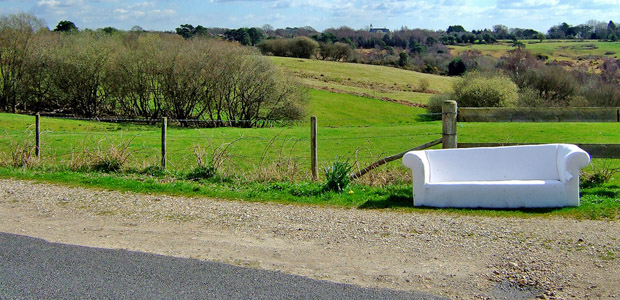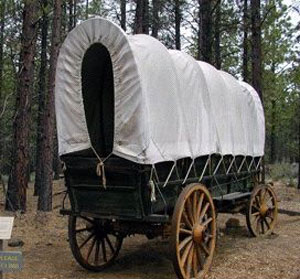 sweens308/FlickrFor the last two years, Jeffery-James Halvorson, a 33-year-old used-car salesman, has been preparing his property outside Arlee, Montana, for the end of America as we know it. “Progressive taxation has failed,” he says, and when the dollar finally collapses, and the shelves at the Piggly Wiggly sit empty, and the oil companies sell every last drop of sweet American crude to China, people will migrate to the Big Sky en masse—and Halvorson believes his compound, where he lives with his cat, 4 dogs, 9 goats, 18 chickens, and an assault rifle, will be perfectly positioned for a new role as a refugee camp.
sweens308/FlickrFor the last two years, Jeffery-James Halvorson, a 33-year-old used-car salesman, has been preparing his property outside Arlee, Montana, for the end of America as we know it. “Progressive taxation has failed,” he says, and when the dollar finally collapses, and the shelves at the Piggly Wiggly sit empty, and the oil companies sell every last drop of sweet American crude to China, people will migrate to the Big Sky en masse—and Halvorson believes his compound, where he lives with his cat, 4 dogs, 9 goats, 18 chickens, and an assault rifle, will be perfectly positioned for a new role as a refugee camp.
Fears of impending societal collapse are nothing new in northwest Montana. But Halvorson’s home is noteworthy for what it has become in the interim: the Orange Acres Dharma Station, a safe house, inspired in part by the television series Lost, where travelers passing through—or looking for work, or sightseeing, or just killing time before their Social Security check comes in—can find a soft bed, a warm shower, and some mini-golf, at no cost for three days. Longer, if they’re willing to put in a little work.
When I stayed at Orange Acres more than a year ago, at the tail end of a cross-country road trip, the place was bustling, filled with that perfectly blended cocktail of humanity otherwise found only at the DMV. Among the guests: a twentysomething guy from Wisconsin, scouting out real estate in Idaho because Israel just bought a ton of military-grade jet fuel, and, as he put it, “things are about to get hairy”; a family of four from Kalispell, way up north by Glacier, looking for work—and a home—in nearby Missoula; a dreadlocked musician (more on that in a second); and an on-again, off-again gold prospector named Carl, perfectly bald with a beard like a badly singed Brillo pad and just one tooth on top that wiggled like a light switch when he got excited. If we could stick around for a few days until his pension came in, Carl said, maybe he could come with us to California.
Orange Acres takes all kinds, provided you follow a few simple rules:
• No alcoholics, crackheads, or members of the Sierra Club, Greenpeace, or PETA
• “[O]n the subject of hippies and rainbow people,” please don’t wear patchouli oil: “That stuff stinks forever”—and bring your own pillowcase if you have dreadlocks.
• Happy Hour starts at 6:30 p.m.; during that time—and only during that time—you may drink beer or smoke pot. Do not get shitfaced or you will be thrown out of the house. If you drink and try to drive, Jeff will handcuff you to a chair and call the cops.
• Dogs and children must be on leashes. This is non-negotiable.
“The place really is not a commune; it is a dictatorship,” Halvorson tells me.
I FOUND HALVORSON and Orange Acres through CouchSurfing.org, an online social network that pairs travelers who need a place to stay with total strangers who don’t mind putting them up—for free. It’s hardly a new concept: Mennonites, Mensa members, and Esperanto speakers all have their own free travel clubs. And since 2002, Hospitality Club has brought a more wide-open approach through the internet. But the former are all confined to niche demographics, and the latter has been slow to take off, owing, perhaps, to its Geocities-chic interface. CouchSurfing is slick, aspirational (its slogan used to be “Creating a Better World, one Couch at a Time”; the current one is “Creating Inspiring Experiences”), and growing fast.
Since its inception in 2004, the site has swollen to 3.7 million members in 249 territories and countries; it touts 6.6 million “positive experiences,” a metric it tracks through a self-reporting survey system. Media reports about travel-networking sites like CouchSurfing—and there have been a few—typically present it as a portal for backpackers and study-abroad types looking to see Europe on a budget, an à la carte youth hostel for the Facebook generation.
And that’s more or less why I signed up: I needed a way to see the country without selling all my baseball cards. Motels were out of the question; campsites charged you extra for Wi-Fi and water (not to mention the whole Grizzly Man thing). So I set up an account, paid $25 to have my address verified through a credit card check, and filled out a profile. With prompts like “Types of People You Enjoy,” “Current Mission,” and “Teach, Learn, Share,” CS bios fall somewhere between a personal ad and a summer camp icebreaker. WikiLeaks maestro Julian Assange, who reportedly registered for the site under the pseudonym “Harry Harrison,” described himself in his profile simply as a “Grown up enfant terrible” interested in “obscure works produced under difficult circumstances by courageous authors.”
The “mission,” as my friend Alex and I had conceived of it, was to see as much of the country as we could in three months, charting a westward course, like an out-of-control seismograph, from Boston to New Orleans to Duluth to Austin to Seattle to San Francisco and various points in between. We sent out a handful of couch requests, stating our purpose, a few innocuous interests (“people”), and an open offer to cook breakfast. Then we hit the road.
 Graham Reznick/FlickrFor the first few weeks, we largely stayed within our comfort zone of young urban professionals and college students—with a few notable exceptions. Our first host, a city councilman in upstate New York who told us he conducted some of his business in strip clubs, put us in charge of the house to leave on a business trip. He left us a note: Do what you want with the place, but please don’t take the television. The next night, we stayed with a retired midwife who passed the time by making oven mitts and who believed she could save squirrels from becoming roadkill by pressing her hands against the windshield while driving and making a noise like a ray gun in a vintage sci-fi flick.
Graham Reznick/FlickrFor the first few weeks, we largely stayed within our comfort zone of young urban professionals and college students—with a few notable exceptions. Our first host, a city councilman in upstate New York who told us he conducted some of his business in strip clubs, put us in charge of the house to leave on a business trip. He left us a note: Do what you want with the place, but please don’t take the television. The next night, we stayed with a retired midwife who passed the time by making oven mitts and who believed she could save squirrels from becoming roadkill by pressing her hands against the windshield while driving and making a noise like a ray gun in a vintage sci-fi flick.
But even in the most familiar of circumstances, it’s tough to shake the feeling that you’re dropping, Being John Malkovich-style, into someone else’s life. Take Sonia, a 30-year-old family practitioner we stayed with in Glasgow, Kentucky, a courthouse town in Barren County (“#1 most livable rural community in America!”) about an hour east of Bowling Green. At the time, she was the only active surfer in a town of about 14,000. On the night we arrive, the county courthouse steps have been appropriated by a Last Days Baptist revival. Sonia rolls her eyes when I relay the news.
Glasgow is an unlikely landing spot for a Polish-born liberal with a soft spot for the Red Army Choir. But Sonia hasn’t yielded an inch: She’s tacked a map of Paris on her living room wall and stocked her bookshelves with back issues of the New Left Review. Her laptop blasts Croatian soft rock, whose dulcet tones might be a contributing factor to her parrot’s ongoing refusal to learn English. On her profile, she advertises “the (only) local deep intellectual discourse in close proximity to Mammoth Cave.”
At least once a month, Sonia reconnects with her friends in Louisville, and they partake in what avid CSers call “invasions”—in which dozens of surfers from one city will “invade” another city for a weekend of scavenger hunts, museum tours, picnics, and the odd Roller Derby match. Two days in Indianapolis probably won’t make her forget about Paris, but, as Sonia puts it, “it reminds me of what I can go and do if I want to go and drive.”
As it happens, Sonia is paged by her hospital just as she’s set the risotto to simmer, and she’s gone for four hours. We’re left to finish the recipe and prevent her 18-month-old neighbor—who’s come over with her mother for dinner—from literally biting off more lefty literature than she can chew. It’s not just the thrill of taking candy from strangers that makes CouchSurfing radical; it’s that the greatest discoveries are built on the day-to-day banalities of someone else’s life.
PART OF THE APPEAL of CouchSurfing is that it offers you the luxury of choosing precisely the kind of person you’re looking to stay with (provided they’ll have you, of course). You can seek out specific hosts—a college senior, a senior citizen, an urban farmer, an actual farmer—with the ease of picking heirlooms at a farmer’s market. It’s an advantage that hitchhiking never had.
And hosts talk openly about traveling vicariously through their surfers. Bud and Carol, a near-retirement-age LDS couple in Utah, had us sign a guest log articulating (among other things) the scope of our trip, along with a written guide to our hometown. They don’t travel much themselves, but their kids do, and so they host as many travelers as they can as a form of karmic insurance. In Mississippi, we stayed with an Air Force vet from Seattle working as a contractor at a Naval air base. He’d given up on meeting new people in Meridian—how could you, unless you joined the Rotary Club or a church? For him, hosting surfers was a way of keeping in contact with folks like himself.
Bill, our host in Duluth, described himself in his profile as a Zamboni operator and freelance detective. In reality, he manned the graveyard shift at an assisted living facility and supplemented his income by donating plasma on the weekends. With the decline of the Iron Range, he explained, blood was now the city’s largest export. This was also false.
Greeting us on the front steps of a Victorian apartment building overlooking Leif Erickson Park, he cuts a distinctive figure—aspiring mutton chops and a shock of rusty-brown hair framing a pair of beat-up glasses held together by masking tape. His neck cranes down and then back up when he walks, as if he’s ever battling an invisible torrent of sleet; the lazy eye almost seems superfluous.
In anticipation of our arrival, he’s sorted through a dumpster for an extra set of couch cushions, bedbugs be damned. But, he warns, “I’m gonna have a rager tonight, kind of. Like it’ll be pretty wild, so if you guys just want to stay with someone else, that’s cool.”
The rager ultimately consists of seven people, clustered in a kitchen. There’s a strobe light in the living room, but no dancing. The whole thing, Bill concludes, would have been better if he could have scored some dry ice. Still, he shows us the side of the city you’ll never find in a guide book: a Brazilian Laundromat with live parakeets; an abandoned ski jump with a panoramic view of the harbor; and the “graffiti graveyard,” an I-35 overpass that’s home to the city’s finest underground art.
When Bill surfs, he wants a “weird experience” and picks hosts accordingly. Some experiences are weirder than others—when he first passed through Duluth, his host suffered a nervous breakdown and took off. Bill ended up moving in with her roommates.
Because he views it as a form of immersion tourism, he can’t stand it when his hosts out him as a surfer to their friends. It makes him feel like a second-class acquaintance. “I made it a thing where I would get people to agree that if we went out and people asked us how we knew each other,” he says, “we’d tell them we used to be camp counselors.”
 Sam Javanrouh/FlickrWhen we met Hannah Perkins at a bar in St. Louis, a male friend staged an impromptu intervention: “You let these people stay at your house?” He meant no offense to us personally, he explained. It’s just that, you know, we could be serial killers.
Sam Javanrouh/FlickrWhen we met Hannah Perkins at a bar in St. Louis, a male friend staged an impromptu intervention: “You let these people stay at your house?” He meant no offense to us personally, he explained. It’s just that, you know, we could be serial killers.
Perkins, a public policy grad student, has been hosting travelers since she was a college freshman at 17. CS is technically 18-and-older, so “basically I just lied,” she says. As a rule, the bigger city, the harder it is to find a free couch, but Hannah’s policy is to never turn away any verified member who needs a place to crash. She gives her guests keys so they can let themselves out; one time she let a surfer borrow her car. When Hurricane Gustav was bearing down on New Orleans in 2008, she got a frantic message from a Gulf Coast farmer who had just found out about the site. (CouchSurfing has a special group for hosts who make their homes available in the event of a natural disaster.) Hannah was in the process of moving, and told him this wasn’t a good time. He showed up anyway, black lab in tow, his life’s possessions strapped to the back of his pickup truck.
“A lot of people see it as a negative, ‘You’re too trusting.’ I just would much rather give people the benefit of the doubt and on occasion get burned than to miss out,” she says. “I mean, this has been a fucking awesome ride. This has been fucking great! I’m 22 years old, and I’ve basically traveled the US by staying in my own apartment!”
The concerns of Hannah’s friend, though, were hardly trivial. Upwards of 95 percent of all conversations with strangers about the project (and a full 100 percent of all conversations with parents) lead to The Question: What’s to stop an innocent young surfer from being hacked into tiny bits?
In a word: references. After every stay, you’re expected to write one for your host, which then appears, permanently, on their profile wall. They in turn, write one for you. By the time we met Hannah, we’d acquired at least a half-dozen positive references each from reputable CouchSurfers. Not enough to compile a detailed character sketch, perhaps, but enough to assuage any lingering fears—namely, that we were polite, “clean,” and moderately engaging.
References are the currency by which CouchSurfing transactions are conducted. It’s a system that encourages aspiring travelers to host as many people as they can and treat them like kings. In Iowa one host took us up in a WWII-era plane over the Mississippi River, then bought us dinner. All he asked, he said, was that we write him nice references; he was planning on going to Europe.
If you find Halvorson’s Orange Acres Dharma Station through Craigslist, you’ll have to fill out a 77-item “psychoanalytic” questionnaire, with inquiries likes “Do you like fruit roll-ups?” and “Do you have any metal plates or screws in you[r] body or any other conditions that would make you sensitive to electro-magnetic energy?” But if you find it through CouchSurfing, you can just show up—provided you have at least three positive and zero negative references.
A negative reference is more or less a death knell. It’s also an exercise in mutually assured destruction. “DO NOT TRUST THIS PERSON. HE IS A FUGITIVE,” reads one counterattack.
CouchSurfing isn’t Yelp, in other words. If your host prattled on about the weather or there was no hot-water shower, keep it to yourself. Female surfers I met who’d had run-ins with creepy guys tended to keep it under wraps, explaining that, absent a serious threat, it simply wasn’t worth launching the warheads. Rachael, a social worker who hosted us in Kansas, had traveled extensively in Europe without much drama, until an Italian host tried to put the moves on her sister. Or as Rachael put it, “He did everything to earn a positive reference, but due to some awkward moments and cultural differences things just never really click [sic] between all of us.”
GUIL JONES’ HOME in the Far West Texas town of Marathon might be the only place on CouchSurfing with its own form of currency (the “Chivo,” featuring an illustration of a mariachi riding a goat, redeemable for a drink of water). Jones, a 63-year-old pilot, had given me a number to call when I got to town—”ask for Ingrid”—but no one picked up, and after a dozen rings, I got a recording of Guil reading from what sounded like something out of the Great Tao, followed by a beep. In his absence, we’re greeted by Eric, an ex-Mormon from the Central Valley who tattooed his face in homage to Melville’s Queequeg and who speaks with a lilt that suggests he was taught English in Spanish by a Russian. Eric moved to Mexico after a spell in prison, but crosses the border by foot to work for Jones three months a year. His first words to me are “Don’t be scared; I’m not a cop.”
As for Jones himself, well, he’s in Illinois, and although there are Kurtz-like reports of sightings around town—someone saw him driving his Camino around Marathon; someone is sure he saw Guil at the watering hole—that’s where he’ll stay for the duration of my visit.
About a decade ago, Jones plopped down $2,200 for 17 city lots in Marathon, a pinprick of a town on US-90 in the Chihuahuan Desert, four hours southeast of El Paso. It was an impulse buy (the place “just seemed eternal,” he says), intended to simply be a personal retreat. Then bicyclists started coming through the Big Bend on their way across the country, and Jones began to see the place as something different—a latter-day caravanserai, the great rest areas of the Silk Road, where travelers could tie up their camels, get a fresh meal, and talk for a while.
The result was La Loma del Chivo (“The Hill of the Goat”), part hostel, part organic farm, part three-dimensional Dali painting. The main building, dubbed “the goat shed,” looks like a Conestoga wagon sprouting out of a Santa Fe B&B. All the buildings have names, too, ranging from the self-evident—”the Unabomber shack”—to the philosophical—the “McMushrooms,” one-bed plywood sheds that are, like fast food, “no good unless you’re hungry.”
“Some people show up, drive by, and don’t stay,” Jones confesses to me later. “I think it’s because it’s such an odd place. It sort of evolved for free. I mean, it was given to us by the Great Wheel.”
 Katherine Squier/FlickrBy the time I reached San Francisco, my inhibitions had eroded beyond recognition. During a hasty apartment search, I listened to one prospective subletter allude, somewhat cryptically, to “The Dynamic” as he showed me around the place. The Dynamic, it turned out, was this: The gas pipe had a leak, so the stove didn’t work, and there was no hot water; if you used more than three appliances (or the microwave, ever), the power would go out, on account of the marijuana growing downstairs. It flew right over my head; of course I’d take the place.
Katherine Squier/FlickrBy the time I reached San Francisco, my inhibitions had eroded beyond recognition. During a hasty apartment search, I listened to one prospective subletter allude, somewhat cryptically, to “The Dynamic” as he showed me around the place. The Dynamic, it turned out, was this: The gas pipe had a leak, so the stove didn’t work, and there was no hot water; if you used more than three appliances (or the microwave, ever), the power would go out, on account of the marijuana growing downstairs. It flew right over my head; of course I’d take the place.
And CouchSurfing itself transformed into something I hardly recognized. Nearly every profile I looked at in San Francisco stipulated that requests must be sent well in advance—and write a real nice letter, too (one profile asks for “a touch of humor and/or flattery”), because they get 20 requests a day and won’t take just anyone.
Part of this is the city effect, but more than a few hosts complained to me about encountering an increasing number of surfers who thought of it simply as a free hotel. The oft-whispered concern is that as CouchSurfing expands, it’ll invite a more opportunistic sort and become, as Bill puts it, “like a SuperFacebook or something.”
“A lot of people now almost treat it like it is a dating site,” adds Bill. “A lot of people think it is a dating site!”
Or much, much worse. In 2009, a Moroccan national was sentenced to 10 years in prison in the England for raping a woman he’d met through CouchSurfing. It was the only violent crime officially linked to the site in seven years, but message boards like CS’s “Independent Women” group are filled with threads relaying other, unreported horror stories. In the fall of 2010, Harvard banned students from hosting guests on-campus through the service, citing safety concerns.
And the fears of a “super-Facebook” have only festered. In August, the site’s executive director and cofounder, Casey Fenton, announced that CouchSurfing would become a for-profit B Corporation, with the ultimate goal of going public. It was, he said, driven by necessity; the IRS had denied CouchSurfing nonprofit status, and the site had to pay for itself somehow. Just 8 percent of users made the $25 donation to become verified members, not enough to cover the ever-increasing expenses.
Fenton raised $7.6 million from venture capitalists like Matt Cohler, whose resume includes previous stops at LinkedIn and Facebook. But the move sparked an immediate backlash from the membership, ranging from anti-corporatist outrage, to concerns over privacy, to the difficult-to-shake fear that in shoring up its finances, CouchSurfing was sacrificing a little bit of its soul. As one surfer put it on a Washington, DC, message board: “What made CS cool was that it was different. It captured a different crowd…what’s [going] to make it different than FB?” There’s that F-word again.
The rules of CouchSurfing are fragile, and, in truth, somewhat variable. But they’re also contingent on a certain degree of innocence. Sleep on enough floors (and in the odd South Dakota cave) and you start to get the impression that CouchSurfing is an idea stuck, precipitously, at the same point in its life as the overwhelming plurality of its membership—basking in the idealism of early adulthood, unconstrained, for the most part, by the burdens and responsibilities that follow. Think of it as an unsexed form of ChatRoulette, where members bounce from futon to futon or guest to guest in pursuit of good karma, or the weird, or the authentic, or just a rager that’s going to be totally wild. It caters to a certain type of traveler who craves social experiences the way a skydiver craves that rush of blood to the head; call them the hospitality junkies.
Once I was settled in San Francisco, I called Bill. He was harvesting sugar beets on the North Dakota border. His dream, he told me, was to move to northern California and open a piñata manufacturing plant; there’s always a prize in piñatas. He’d always be a CouchSurfer, but he admitted its role seemed to be changing as he—and the site—grew older.
“When you’re 21 and aimlessly wandering the globe, you’re just doing whatever you want to do,” he said. “When you’re 26 and you’re doing the same thing, it’s like, ‘This guy is homeless.'”













